I wasn’t born yet, but I tend to buy the argument that the 70s boom was largely to do with the boomers having disposable income, with the oil crisis being a minor side-attraction. The booms of the 80s and beyond were all about the pursuit of sport, not transportation. So, at least as the American cycling experience is concerned, we are in the midst of the first post-car bike boom that’s really about transportation instead of sport… about taking the car-friendly landscape and turning it into a bike-friendly landscape.
Portland has long been the epicenter of this boom, but San Francisco has played a big part of this boom as well, especially as we’ve crossed over from the Critical Mass idealistic anti-car idealized vision of a future to the realpolitik of convincing people who can afford a Tesla to instead pick the bike as their carbon-free form of transportation.
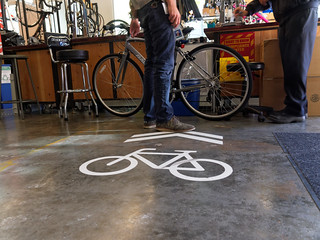 As "The Bike Guy" at my place of employment, I found myself in a room of other bike advocates at the Facebook campus a few weeks ago. Some of the people there were like me, just a regular employee who had an interest in bikes and bike facilities and who did this alongside a regular role. Some folks were people who were deliberately paid to run the corporate transportation program or the corporate bike program, where it was their full-time gig.
As "The Bike Guy" at my place of employment, I found myself in a room of other bike advocates at the Facebook campus a few weeks ago. Some of the people there were like me, just a regular employee who had an interest in bikes and bike facilities and who did this alongside a regular role. Some folks were people who were deliberately paid to run the corporate transportation program or the corporate bike program, where it was their full-time gig.“Start Anywhere,” said the Stanford bike coordinator in her talk. She led us through the sense of history behind cycling at Stanford, showing us a picture from 1891 during the very first bike boom that started when you could buy a practical ‘safety’ bike. As an advocate for getting people to work safely and efficiently, there’s a multitude of options available. She felt that, instead of seeking for the biggest fastest win, any of them would be a good place to start. Easy steps that get some results can lead to harder steps that require budget. One thing I noticed was that Target started their bike program in the twin cities of Minneapolis and St. Paul because the city required them to have a bike room. Eventually, that legally-required bike room led to a larger program that eventually resulted in quite an impressive bicycle commuter share in the Target headquarters, something that they could be proud of.
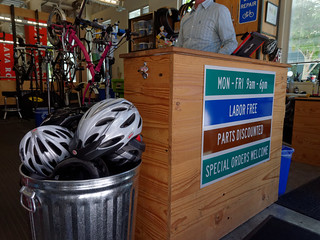 I've made a point of mostly concentrating on the positive message of bicycling. Sure, if you ride unsafely, biking can be unsafe. However, statistically speaking, it's a net gain in lifecycle even without talking about the externalities of getting cars off the road. Stanford has had to contend with this even more. College is a time for experimentation while you still feel unlimited and free of consequences. I know that, while I was always a lot more restrained than my peers, I didn't really come to terms with my own mortality until I was in my twenties. She talked about the helmet challenge to catch students in the freshman dorms. She also talked about their work at starting with the "cool people" like the sports team, who were both already more motivated to ride their bikes for exercise but also people who have an influence of connections.
I've made a point of mostly concentrating on the positive message of bicycling. Sure, if you ride unsafely, biking can be unsafe. However, statistically speaking, it's a net gain in lifecycle even without talking about the externalities of getting cars off the road. Stanford has had to contend with this even more. College is a time for experimentation while you still feel unlimited and free of consequences. I know that, while I was always a lot more restrained than my peers, I didn't really come to terms with my own mortality until I was in my twenties. She talked about the helmet challenge to catch students in the freshman dorms. She also talked about their work at starting with the "cool people" like the sports team, who were both already more motivated to ride their bikes for exercise but also people who have an influence of connections.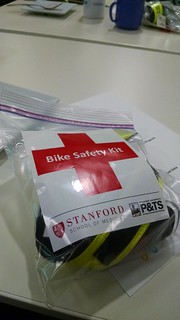 Stanford has a 'kit' with headlights, taillights, legbands, and some propganda that they hand out to incoming students to encourage them to bike safely. I've always been a bit split-minded about this because it's one thing to hand someone a lights and it's another to convince them that it is actually important to have lights at night, so much so that they should replace the batteries when they run out. Still, the lights they are handing out are head-and-shoulders above some of the free lights I've seen handed out in the past.
Stanford has a 'kit' with headlights, taillights, legbands, and some propganda that they hand out to incoming students to encourage them to bike safely. I've always been a bit split-minded about this because it's one thing to hand someone a lights and it's another to convince them that it is actually important to have lights at night, so much so that they should replace the batteries when they run out. Still, the lights they are handing out are head-and-shoulders above some of the free lights I've seen handed out in the past.Facebook hosted the event and used it to show off their bike facilities. I was expecting something akin to what we had when I was at Y!, being a similarly sized campus with a similar set of constraints, but Facebook has really worked hard on their bike facilities. Like many large office complexes in the bay area, they were ‘encouraged’ by the local governments to pursue car alternatives by being required to not have a parking space for each employee.
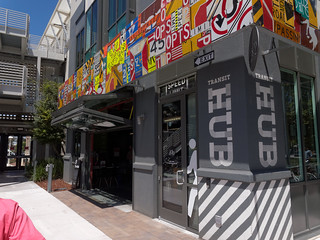 Facebook built a bike hub at a very obvious spot in the center of campus. Placing it in a position of honor instead of at the side-entrance for bike-hippies almost means more than mere money spent. The repairs are mostly free -- if they need to order parts, you pay wholesaler parts but the bike repair staff are paid to be there by the company. Furthermore, on a statistical basis, men tend to be the early-adopters of cycling commuting and women tend to be the late-adopters, so Facebook spent some specific efforts to help encourage the women cyclists, so that it's not just a guy's thing.
Facebook built a bike hub at a very obvious spot in the center of campus. Placing it in a position of honor instead of at the side-entrance for bike-hippies almost means more than mere money spent. The repairs are mostly free -- if they need to order parts, you pay wholesaler parts but the bike repair staff are paid to be there by the company. Furthermore, on a statistical basis, men tend to be the early-adopters of cycling commuting and women tend to be the late-adopters, so Facebook spent some specific efforts to help encourage the women cyclists, so that it's not just a guy's thing.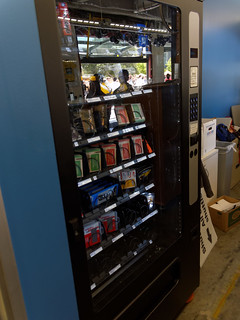 They have a free vending machine for spares and patches with the prices listed. The intention is to encourage people to feel free to use the bike parts, but to also be responsible about using them.
They have a free vending machine for spares and patches with the prices listed. The intention is to encourage people to feel free to use the bike parts, but to also be responsible about using them.I’m a little envious that they can work at that large of a scale, because they’ve got enough people that they can keep a warehouse of loaner bikes for the interns, with enough extras so that everybody gets a bike that is the correct size.
The campus is also large enough that it helps to have a system of ready-to-use bikes on a rack so that you can cross the campus faster or perhaps go on a quick exercise jaunt through the baylands. One innovation I thought fairly cool was a long-tail cargo bike set up to transport 4 other bikes, so that they can redistribute bikes quickly and without needing a motorized cart.
They have taken this experience to try and replace all of the other little transportation needs throughout their campus that are normally done either with golf carts or push carts and accomplish them with cargo bikes instead.
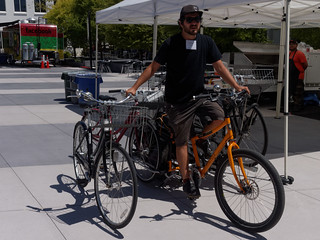 Many of us talked about how awkward we felt about our existing bike facilities. We had borrowable bikes, but there's a key lock on them that you need to check out from the front desk and sign out from a three-ring binder.
Many of us talked about how awkward we felt about our existing bike facilities. We had borrowable bikes, but there's a key lock on them that you need to check out from the front desk and sign out from a three-ring binder.Given that this happened in the bay area, where technology is fast to be accepted and many of us work in the field of technology, we spent some time talking about technology. Part of what makes the modern revolution more interesting is that, while the bike has changed and progressed in a few fairly small ways, the world of technology that we can apply to bikes has changed dramatically, thus solutions that didn’t work in the 60s work very well today. Another one of my areas of professional interest besides geeks on bikes is the whole API community that is becoming increasingly tied to the Internet of Things.
As I’m advocating for bikes, I’m also one of those guys (I can’t claim to be ‘that guy’ because Kin Lane is more ‘that guy’ than I) at an API conference or two who had to point out that everybody’s car-centric vision of the Internet of Things needed to be adjusted because it worked perfectly good for bikes and transit, but only if they expand their mind a little bit and apply it to things other than cars.
Take for example sharing of bikes. It’s a good way for visitors from out of town to get around sans-rental-car, a good way to get people to try it out without spending the money on a new bike, and often times a convenient gap-filler in the car-free lifestyle. It can exist on both the city-level and also as a service companies provide to their employees.
A long time ago, bike sharing on a city-level was a guaranteed loss. You put up bikes painted a semi-un-attractive color, with parts that deliberately don’t quite fit normal bikes, and hope that they don’t disappear. In some towns with the right combination of population and civics, it might work… but it’s hard.
More recently, bike sharing became a thing where you could make hard-to-vandalize bikes and hard-to-vandalize fixed bike sharing stations. The Velib system is a shining example of this… but it’s still something designed with the restrictions of ten years ago, not today’s technology.
Again, the unintentional theme was “Start Anywhere” so we ended up talking about which solutions work for which situations.
One thing to remember is that none of these solutions need to be perfect, they just need to be fiscally responsible. It’s OK to have a few bikes go missing out of a large fleet, it’s just not OK to have them disappear too quickly.
There are two pieces to this puzzle. One piece is tracking… the ability to know where a bike is. The second piece is security… the ability to know who has a bike and where they took it and make the bike immovable.
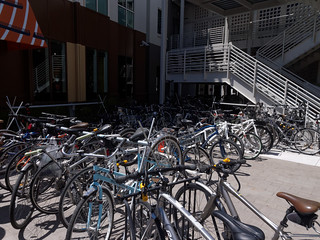 Many companies only really need tracking. The Facebook campus, for example, is in enough of a secured zone that they can assume that if you can reach a Facebook bike, you probably are an employee or contractor. So they just need to know if there's a cluster of bikes that might need to be re-distributed to another part of the campus, to track maintenance intervals, and to single out stolen bikes.
Many companies only really need tracking. The Facebook campus, for example, is in enough of a secured zone that they can assume that if you can reach a Facebook bike, you probably are an employee or contractor. So they just need to know if there's a cluster of bikes that might need to be re-distributed to another part of the campus, to track maintenance intervals, and to single out stolen bikes.For urban-based companies, you probably need some degree of security so that the bikes can be locked up and you probably also need location information, but you can assume good actors. There are several smartphone-actuated solutions on the way with varying form factors. Consider a U-lock with a solar cell on the shackle so that a user with the application installed on their phone can connect to the U-lock via Bluetooth, authenticate under their account, unlock or re-lock the shackle, and preserve the location.
We also discussed the next generation of bike-sharing. Right now, a bike sharing system for a town needs to give up space for fixed check-out stations. Because this could be used for car parking or even bike parking, this becomes a contentious issue even as it also provides free advertising for the system.
The same degree of functionality that is required to drive a cheap low-end cellphone, when secured inside of the bike, lets you continuously track the bike, squirt the bike’s location to a central server for tracking, and remotely control a lock. Instead of putting the tamper-proof logic in a check-out station, you can put it on the bike and then every lamppost becomes a check-out station. Similarly, if you can track bikes as they move, it becomes easier to send someone to retrieve bikes that have strayed outside of the designated zone. You might not even really need to fully secure the bike, relying on basic human honesty and the ability to send out a guy in a truck the second it crosses a geo-fence.
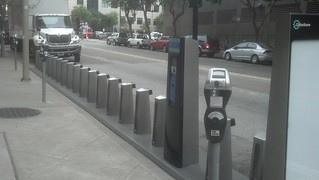 This comes at an interesting time for the bike sharing systems, as one of the providers in North America went bankrupt. Will all of the fancy systems that cities have installed become useless? I tend to think not quite, because most of the older systems could benefit from a retrofitted tracker. Whereas there are benefits to having a station where you know there will always be bikes. Still, I haven't actually used the San Francisco system yet because it isn't really where I want it to be.
This comes at an interesting time for the bike sharing systems, as one of the providers in North America went bankrupt. Will all of the fancy systems that cities have installed become useless? I tend to think not quite, because most of the older systems could benefit from a retrofitted tracker. Whereas there are benefits to having a station where you know there will always be bikes. Still, I haven't actually used the San Francisco system yet because it isn't really where I want it to be.
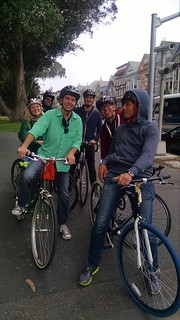 "Start anywhere" isn't a restating of "Every little bit counts." Every little bit doesn't count. What does count is the basis to build something bigger off of the earlier step. Everything we talked about was something that started with a small change and was able to be built upon. Going from zero bike storage rooms and zero showers to one bike storage room and shower to a proper bike culture. Starting from a small number of bikes on a rack to a larger system. Every person there had a story that started with something small and then expanded to something larger.
"Start anywhere" isn't a restating of "Every little bit counts." Every little bit doesn't count. What does count is the basis to build something bigger off of the earlier step. Everything we talked about was something that started with a small change and was able to be built upon. Going from zero bike storage rooms and zero showers to one bike storage room and shower to a proper bike culture. Starting from a small number of bikes on a rack to a larger system. Every person there had a story that started with something small and then expanded to something larger.So maybe, while I’m a bit skeptical about completely station-less bike sharing systems, that extra little bit fills in the gaps. While I’m skeptical about requirements that apply forceful requirements on businesses, maybe local laws that require new construction to be bike-friendly can enact real cultural change. Maybe we really are on the verge of even greater levels of car-free technology.